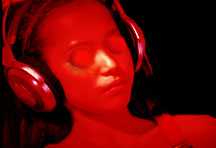Parapsychology
From Wikipedia:
- w:Parapsychology is a field of study concerned with the investigation of paranormal and psychic phenomena. Parapsychologists study telepathy, precognition, clairvoyance, psychokinesis, near-death experiences, reincarnation, apparitional experiences, and other supernatural and paranormal claims.
- See the bolded link for the current version of the Wikipedia article.
To parapsychologists, parapsychology is not the study of "supernatural" claims, as such, as that term implies a source from beyond the natural world (e.g, as in the divine). Parapsychology only studies experiences assumed to be an (unknown) aspect of the natural world. However, parapsychologists may consider reports that are considered by some to be supernatural, looking for natural evidence, explanations, or repeatability.
- Paranormal indicates "Beyond the range of normal experience or scientific explanation: [for example] such paranormal phenomena as telepathy; a medium's paranormal powers."[1] See w:Paranormal for the current Wikipedia article.
Parapsychology, as a scientific and scholarly endeavor, is the investigation of paranormal experiences and the design and results of experiments. This distinguishes it from maintaining a belief in the various topics that are studied.
Scientific Status
"Many scientists have expressed doubts that psi – the broad term for paranormal phenomena such as telepathy, precognition, and psychokinesis – is real or that parapsychology is a genuine science. On the other hand, some scientists support parapsychology." --Scott A. McGreal, blogging on Psychology Today.[2]
- Our subpage examines the dispute.
Cognitive Function and Paranormal Belief
The subpage studies the relationship between cognitive function and belief in the paranormal.
Notable Areas of Research
There are several areas of study with replicated experiments in parapsychology with claimed positive results: The Duke University JB Rhine inspired ESP studies, the Stanford Research Institute inspired Remote Viewing studies, the Maimonides Medical Center inspired Dream Telepathy studies, the Honorton inspired Ganzfeld studies, the "psychic staring" studies, of which Rupert Sheldrake is a current notable proponent, the Helmut Schmidt/Princeton Engineering Anomalies Research inspired micro-psychokinesis random number generator inspired studies, and the Rhine/Schmidt/Bem inspired precognition/presentiment studies. Parapsychology is a statistical science and results are measured statistically in a variety of ways. It is possible that no single experiment provides sufficient evidence and therefore meta analyses, (groupings of studies that are unified into a single, large sample) may be required to demonstrate an effect.
With each covered area of research shown below, specific sources are on the subpage, or linked from there.
Extrasensory Perception Studies
From Wikipedia:
- Extrasensory Perception is the ability to acquire information shielded from the senses...
Remote Viewing Studies
From Wikipedia:
- Remote viewing ... is the practice of seeking impressions about a distant or unseen target using subjective means ... or "sensing with mind".
Dream Telepathy Studies
From Wikipedia:
- Dream telepathy is the purported ability to communicate telepathically with another person while one is dreaming.
Ganzfeld Studies

From Wikipedia:
- A Ganzfeld experiment (from the German for “entire field”) is a technique used in parapsychology which claims to be able to test individuals for extrasensory perception (ESP). The ganzfeld experiments are among the most recent in parapsychology for testing telepathy.
Staring Studies
From Wikipedia:
- The Psychic_staring_effect (sometimes called scopaesthesia) is a supposed phenomenon in which humans detect being stared at by extrasensory means.
Psychokinesis Studies
From Wikipedia:
- Psychokinesis (Greek ψυχή κίνησις, "mind movement"),or telekinesis, is an alleged psychic ability allowing a person to influence a physical system without physical interaction.
Precognition Studies
From Wikipedia:
- In parapsychology, precognition (from the Latin præ-, "before" and cognitio, "acquiring knowledge"), also called future sight, and second sight, is a type of extrasensory perception that would involve the acquisition or effect of future information that cannot be deduced from presently available and normally acquired sense-based information.
Seminars
Seminars will explore parapsychology informally, as discussion between participants. Please use the seminar page for questions and comments on the topic, and place questions or comment about the process on the attached Discussion page. Please sign all contributions to seminars. Seminar content may later be refactored to become specific educational resources placed elsewhere in this structure, for example, the first seminar is /Seminar/Introduction, it may later be refactored to Introduction representing a consensus document as an introduction to parapsychology. See /Seminar for a list of seminars.
Sources
See this page (linked from the section header) for published sources on parapsychology and a subpage of it, (/Sources/Peer reviewed), for peer-reviewed sources.
External links
The subpage contains a list of web sites relevant to this study, including comments.
- ↑ American Heritage® Dictionary of the English Language, Fifth Edition. (2011). Retrieved March 15 2015 from http://www.thefreedictionary.com/paranormal
- ↑ https://www.psychologytoday.com/blog/unique-everybody-else/201401/is-there-scientific-taboo-against-parapsychology